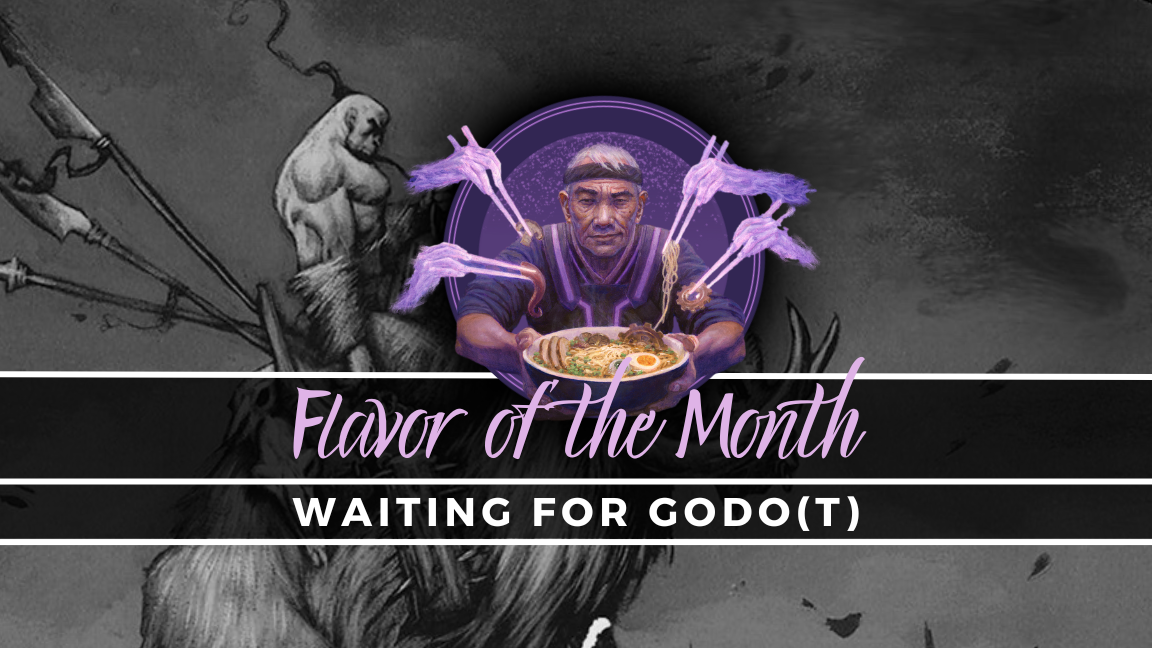Flavor of the Month: Waiting for Godo(t)

Beckett's Absurdist Classic is Back, in Magic Form!
Welcome to Flavor of the Month, where we build decks flavor first!
With new Magic sets being released faster than Now That's What I Call Music albums--I think we're on #89 of that music series now, no joke--hundreds and hundreds of new cards are released into the card pool every year. With every set comes a few cards that inevitably advance our decks' goals a little more efficiently than we were able to before, or start the wheels a'turnin' quicker than ever, so as time goes on, our Commander decks become more optimized, more efficient, and faster. This could be either good or bad depending on who you ask, but it's a phenomenon that is common in pods across the world.
It actually takes effort to make a deck that is clunky and non-synergistic, which is what we're going to do today: we're going to make one of the most inefficient decks you've ever seen while being able to still pull out a win. How inefficient? Well, we won't be able to cast our commander.
Why? The short answer is that, for this deck, we're channeling Samuel Beckett's play, the poster child for absurdist theatre and art in general, the astoundingly bleak Waiting for Godot. Hang tight, y'all.

Ingredients
The longer answer to why we're going to build an inefficient deck that can't cast its commander requires us to go into what Waiting for Godot is and how absurdism operates. You can skip to the decklist below if you'd like, but I promise you'll enjoy it more if you come to it with a better understanding of this stuff. I've spent a lot of time talking about the connection between Magic, art, and creative expression, and I won't rehash it here. Suffice it to say that Magic decks, particularly in the Commander format, are extremely flexible in providing us modes of expression that include creating unique tributes to movies, poems, books, paintings--or plays.
Waiting for Godot is one of the most influential and important pieces of theatre in the last century, if not the most, in my humble opinion. Many famous actors have played the lead roles of Estragon and Vladimir over the years; I wish I could have been there to see Patrick Stewart and Ian McKellen play them in 2009, or--my heart!--Robin Williams and Steve Martin back in 1988.
What makes it so special? Would you believe me if I told you it's a play about two wandering old men who stand around on the side of a country road, confused and bickering, for two days, and nothing really happens? And that it's funny? Well, you should, 'cause that's the play.
So what is absurdism, and how will we translate it into our deck? Britannica describes such a play as one in which "there is little dramatic action as conventionally understood; however frantically the characters perform, their busyness serves to underscore the fact that nothing happens to change their existence." In other words, lots of activity, but little meaning or traditional narrative structure. There's also the absurdist philosophy that gained a lot of traction after World War I, wherein many people realized that the institutions they put their faith in--religion, nation/country, etc.--weren't inherently good, and we'd have to make our own meaning in life from now on. Or decide not to make meaning (hence, absurdism).
Lest you think I was being flippant when I gave the overview of the play two paragraphs above, that's really what the plot of Waiting for Godot boils down to. Two old men, Vladimir and Estragon, are waiting on the side of the road for someone named "Godot" to arrive. He never does, though they end both of the days in the play hopeful that he will tomorrow, as he's promised. It's hinted that they may have been there for well longer than those two days, waiting in vain, but it's not clarified.
The scenery is a country road with a single tree center stage. There is a pair of shoes that appears in Act 2, and two other characters cross Vladimir (Didi) and Estragon (Gogo) in the play: Pozzo, something of a pompous aristocrat, and Lucky
And yet, it's one of the greatest works of theatre in our time, both because of the pointed questions absurdism throws at us about our lives and purpose, and also because of the witty, circular, and fascinating dialogue. Fans of everything from Wes Anderson films to The Eric Andre Show owe a lot to Beckett and absurdism, even if indirectly; the form's circular language patterns and non-sequiturs have been fully absorbed into mainstream media, especially on the comedy side.
(Vladimir: "Well? What do we do?" Estragon: "Don't let's do anything. It's safer." -- this may as well be dialogue from The Life Aquatic.)
Now that we've set the stage, let's get back to Magic!
We're setting out to build a deck that sticks to the core of absurdist philosophy and the rough outline of Godot, and the general conceit is actually fairly simple: we're waiting for our commander, (naturally, Godo, Bandit Warlord
Preparation
It's one thing to make a commander uncastable, a simple solution in that I've put no Mountain
The best part is how close the deck is to being able to make red mana. Baldur's Gate
Maximum futility is the underlying theme here, and it doesn't stop with the commander: we have many inefficient, incompatible, and/or nonsensical cards all over this deck that seem like they should work well together, but are missing a key part or are out of place. We have Coretapper

Deserts are thematically on-brand, given the empty environment Didi and Gogo exist in. They're also some of the least efficient lands ever printed when it comes to doing utility stuff; no one is excited about Grasping Dunes
That's not to say we're playing only bad cards: there are some legitimate ways we'll have to win, mostly around biding our time and plopping down mana rock after mana rock for some big spells. Don't underestimate the power of turning a board of inert artifacts into an army with Karn, Silver Golem
There are a few objects in the play we've found a way to represent in-game. Gogo's boots are Trailblazer's Boots
Another interesting thing the play, er, plays with is time. Have Vladimir and Estragon just arrived that first day, or have they been waiting for days, weeks... years? Centuries? It's a crucial question to the plot, and it also absolutely does not matter. Time is a construct, and in Magic, that construct is Aeon Engine
Sands of Time
And how could we have a deck that plays with time without Karn Liberated
Of course, there is one other way we could win. If Godo(t) would just show up!
There is, conceivably, one way that we could cast our commander. But that possibility, like life (according to the absurdists), is entirely out of our control: an opponent could give us a Treasure. This could be via Descent into Avernus
And if we do get that Treasure? (Estragon: "And if he comes?" Vladimir: "We'll be saved.")
Yep, it's the old cEDH standby, Helm of the Host
People have been doing that combo since Dominaria, and it wouldn't be worth an article here if that was what we were actually trying to do. But I can promise you no one has tried to win with a Godo deck without red mana. To attempt that would be, well, absurd.
Yield
It's a challenge to win with this deck, but an undoubtedly unique experience! And who doesn't like a challenge? Here's the full decklist:
Waiting for Godo(t)
View on ArchidektCommander (1)
Artifacts (33)
- 1 Aeon Engine
- 1 Bag of Holding
- 1 Basalt Monolith
- 1 Bullwhip
- 1 Clock of Omens
- 1 Crucible of Worlds
- 1 Dreamstone Hedron
- 1 Expedition Map
- 1 God-Pharaoh's Statue
- 1 Hedron Archive
- 1 Helm of Kaldra
- 1 Helm of the Host
- 1 Hithlain Rope
- 1 Hot Soup
- 1 Liquimetal Torque
- 1 Mind Stone
- 1 Planar Atlas
- 1 Pristine Talisman
- 1 Sands of Time
- 1 Sol Ring
- 1 Swiftfoot Boots
- 1 The Irencrag
- 1 The Mightstone and Weakstone
- 1 The Stasis Coffin
- 1 Thought Vessel
- 1 Thran Dynamo
- 1 Timesifter
- 1 Trailblazer's Boots
- 1 Ugin's Nexus
- 1 Unwinding Clock
- 1 Ur-Golem's Eye
- 1 Whispersilk Cloak
- 1 Worn Powerstone
Sorceries (2)
Lands (35)
- 1 Arch of Orazca
- 1 Ash Barrens
- 1 Baldur's Gate
- 1 Blasted Landscape
- 1 Buried Ruin
- 1 Cloudpost
- 1 Cradle of the Accursed
- 1 Demolition Field
- 1 Desert
- 1 Deserted Temple
- 1 Dunes of the Dead
- 1 Dust Bowl
- 1 Eldrazi Temple
- 1 Endless Sands
- 1 Faceless Haven
- 1 Field of Ruin
- 1 Field of the Dead
- 1 Forgotten Monument
- 1 Grasping Dunes
- 1 Grixis Panorama
- 1 Hostile Desert
- 1 Phyrexia's Core
- 1 Roadside Reliquary
- 1 Scavenger Grounds
- 1 Strip Mine
- 1 Sunscorched Desert
- 1 Temple of the False God
- 1 Urza's Mine
- 1 Urza's Tower
- 1 Wasteland
- 4 Wastes
- 1 Zhalfirin Void
Creatures (22)
- 1 Awakened Amalgam
- 1 Clockwork Gnomes
- 1 Coretapper
- 1 Darksteel Myr
- 1 Desolation Twin
- 1 Diamond Mare
- 1 Eater of Days
- 1 Hangarback Walker
- 1 Hollow One
- 1 Jhoira's Timebug
- 1 Karn, Silver Golem
- 1 Liberator, Urza's Battlethopter
- 1 Millikin
- 1 Myr Propagator
- 1 Myr Retriever
- 1 Palladium Myr
- 1 Patchwork Automaton
- 1 Primal Clay
- 1 Shimmer Myr
- 1 Solemn Simulacrum
- 1 Voltaic Servant
- 1 Wandering Archaic // Explore the Vastlands
Instants (3)
Enchantments (1)
Battles (1)
Planeswalkers (2)
That's it for this month; hope you enjoyed this build. I'm enjoying finding weirder and weirder concepts to put into a deck! Let me know in the comments below what you thought and if there are any other projects you'd like to see tackled on Flavor of the Month. And of course, if I unwittingly DID accidentally include a means in-deck of making red mana, do let me know so I can remove it! I know I caught a couple of weird interactions in earlier drafts of this deck that could conceivably result in red mana in this player's pool, so it's possible I missed one more! Unlike Godot, I'm only human.